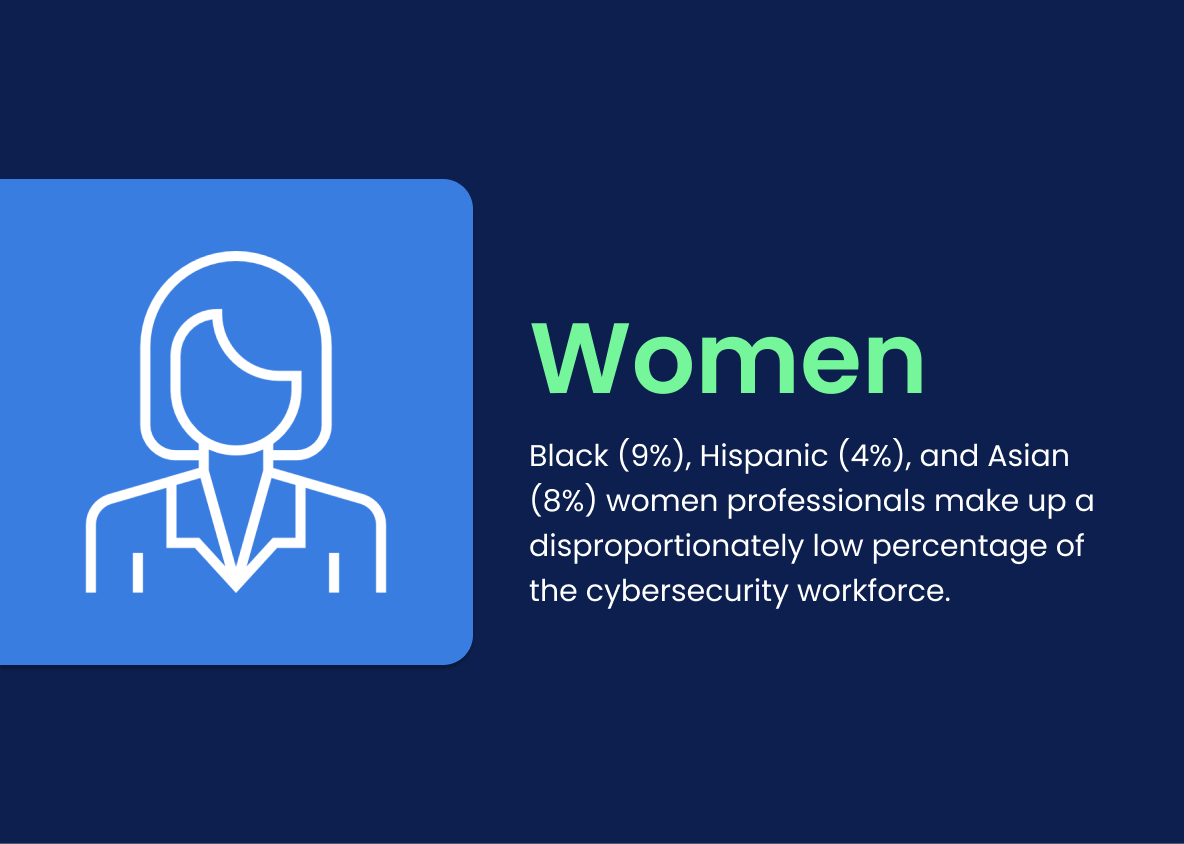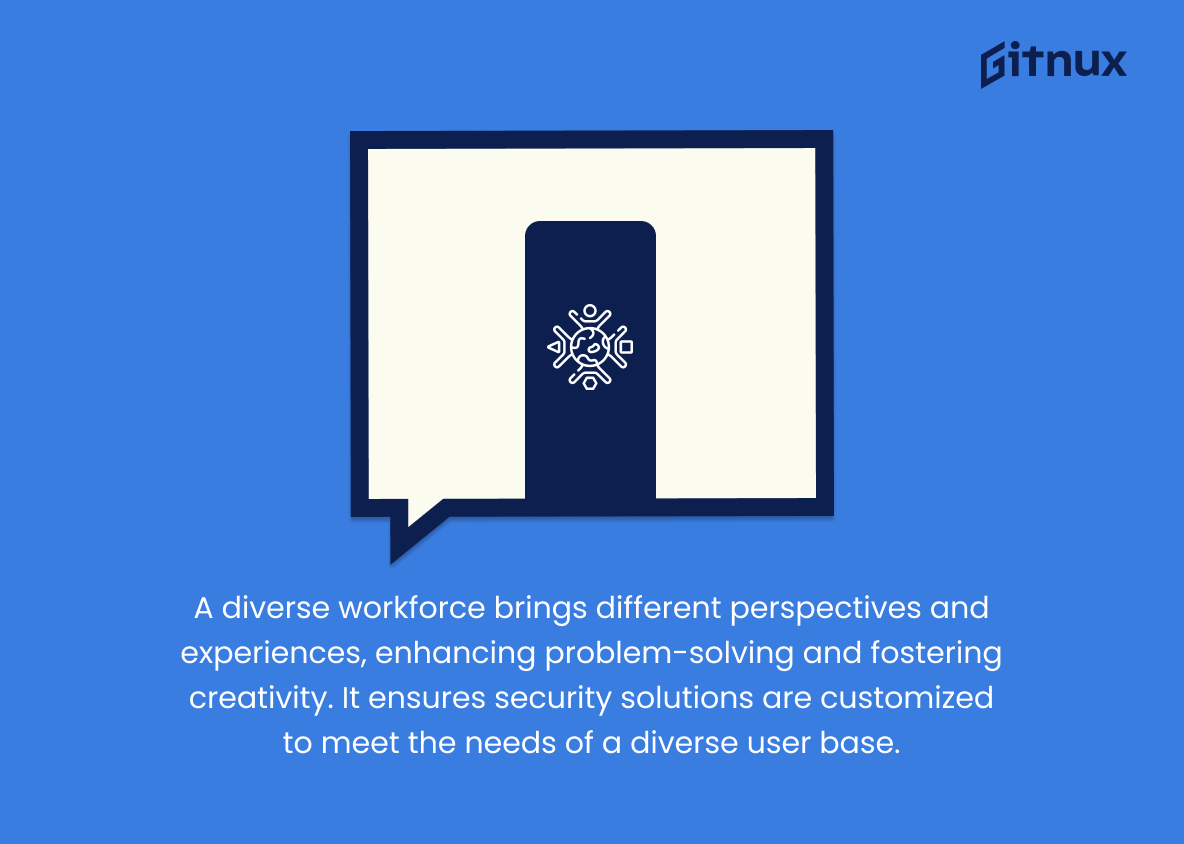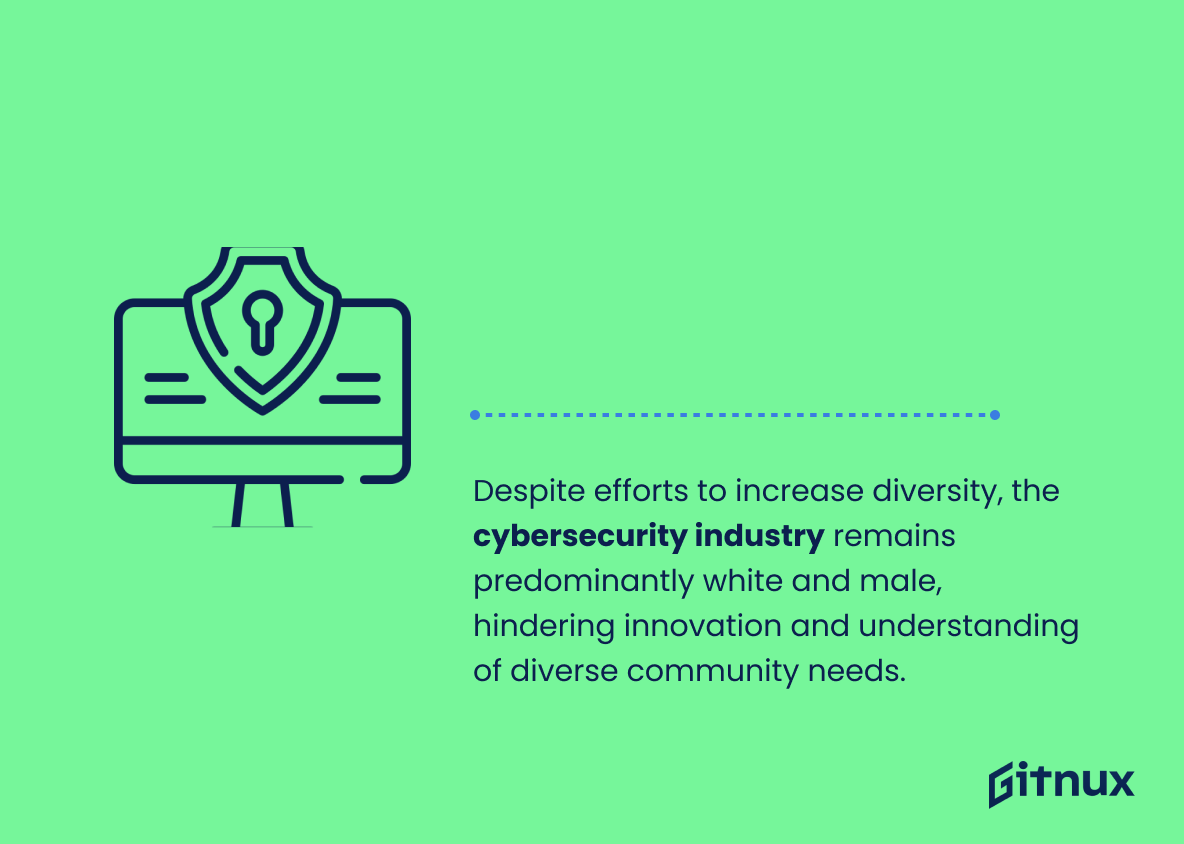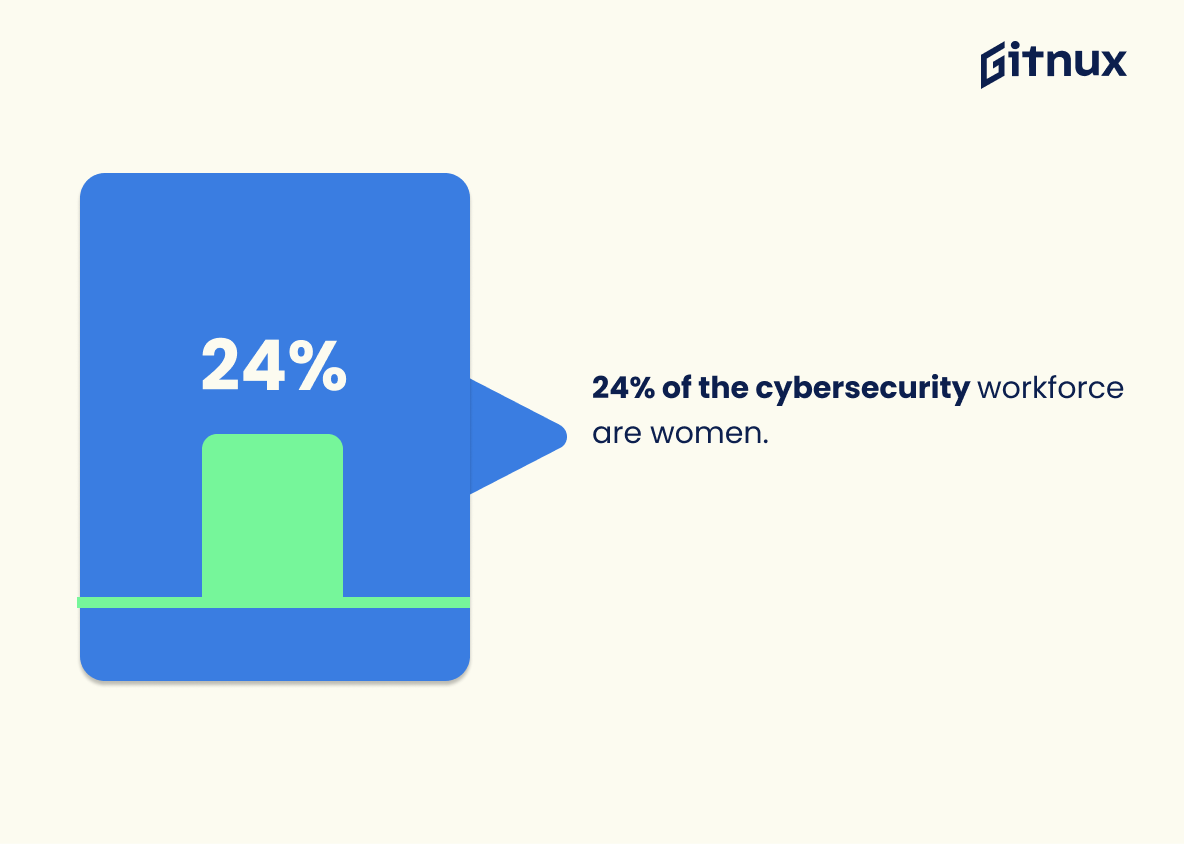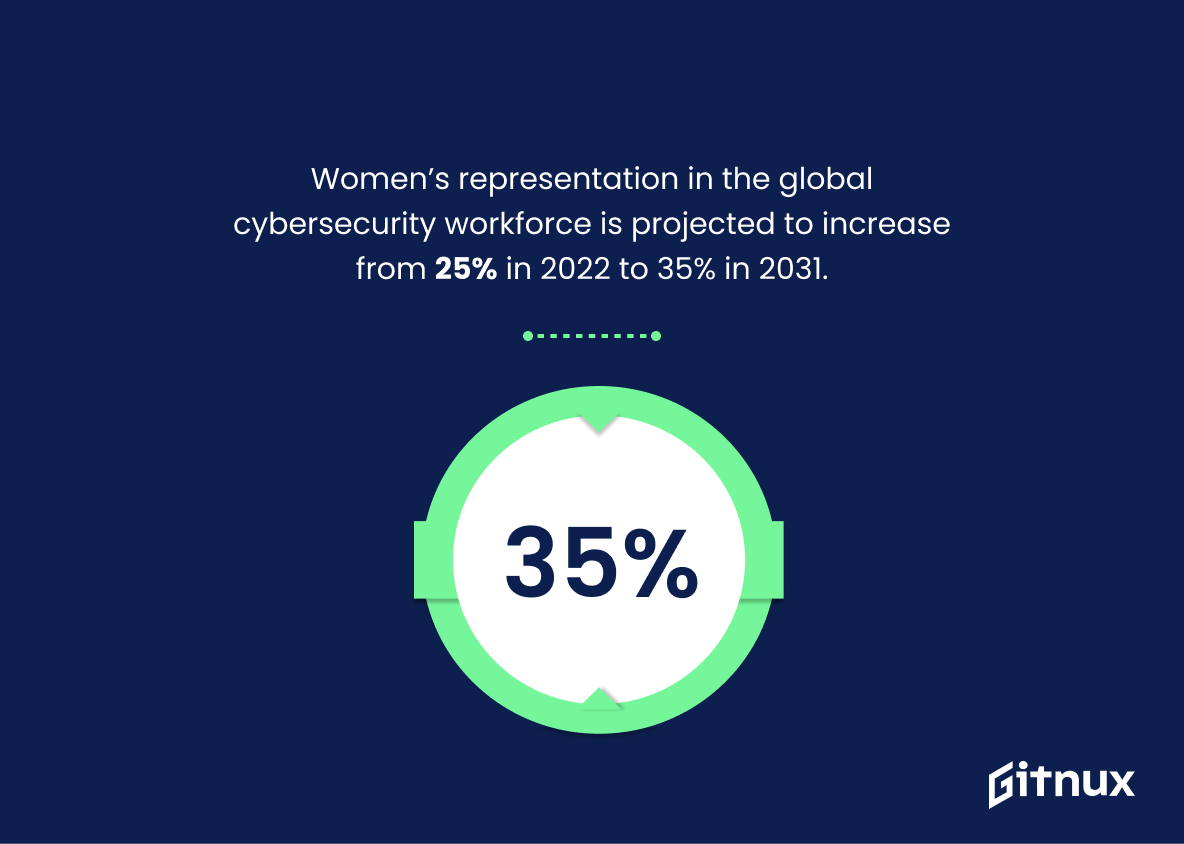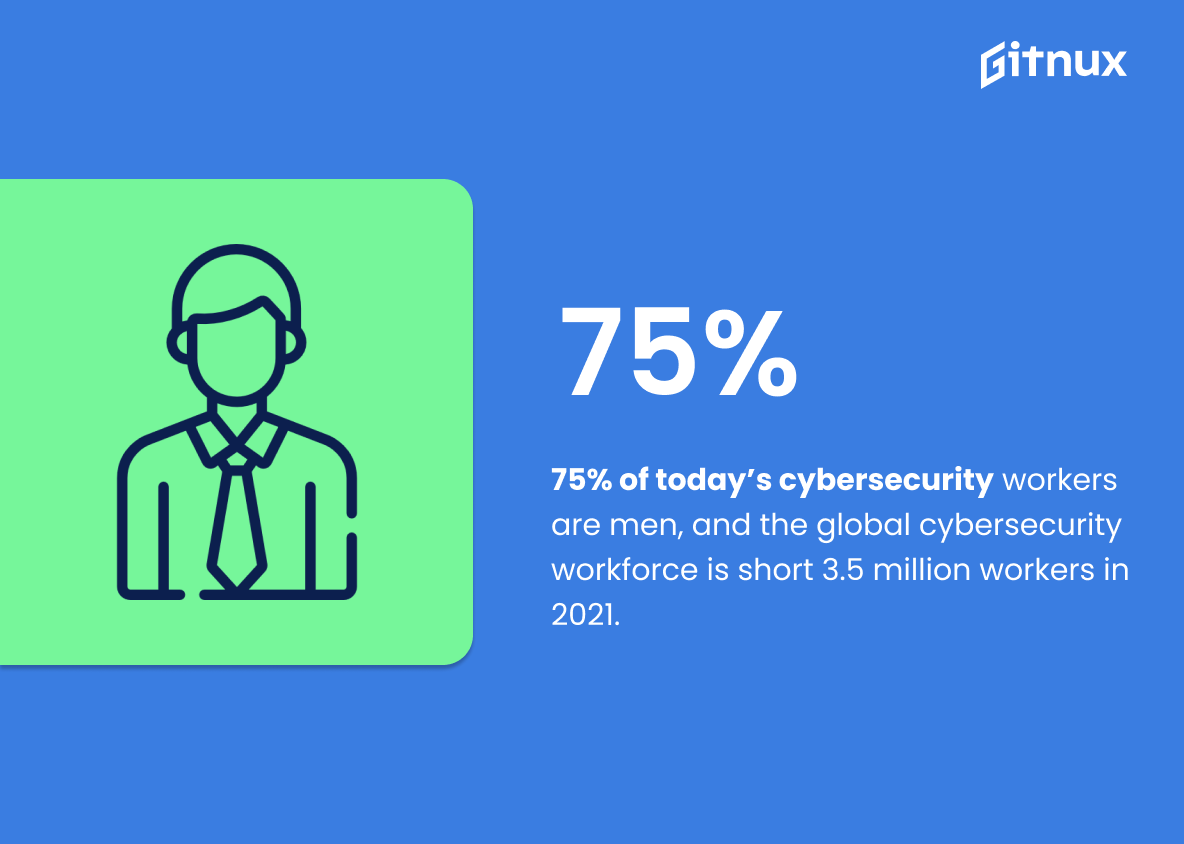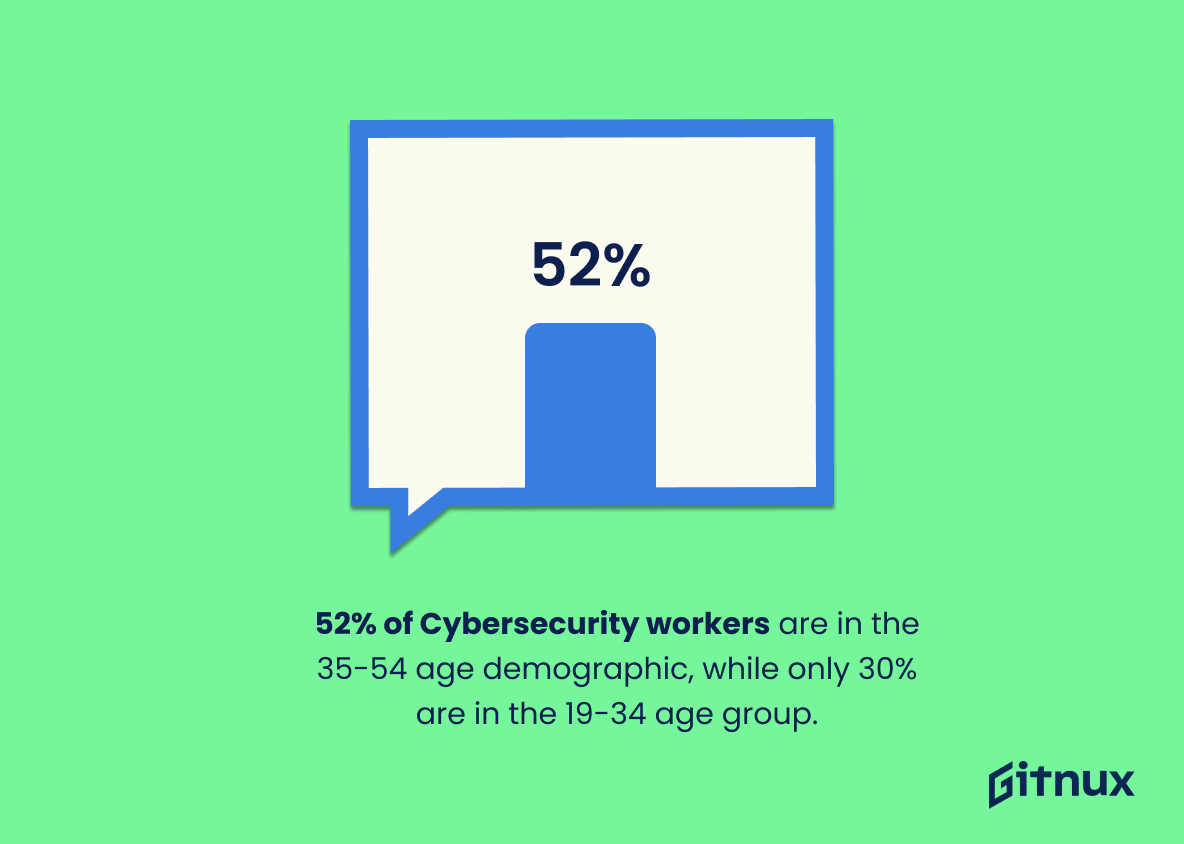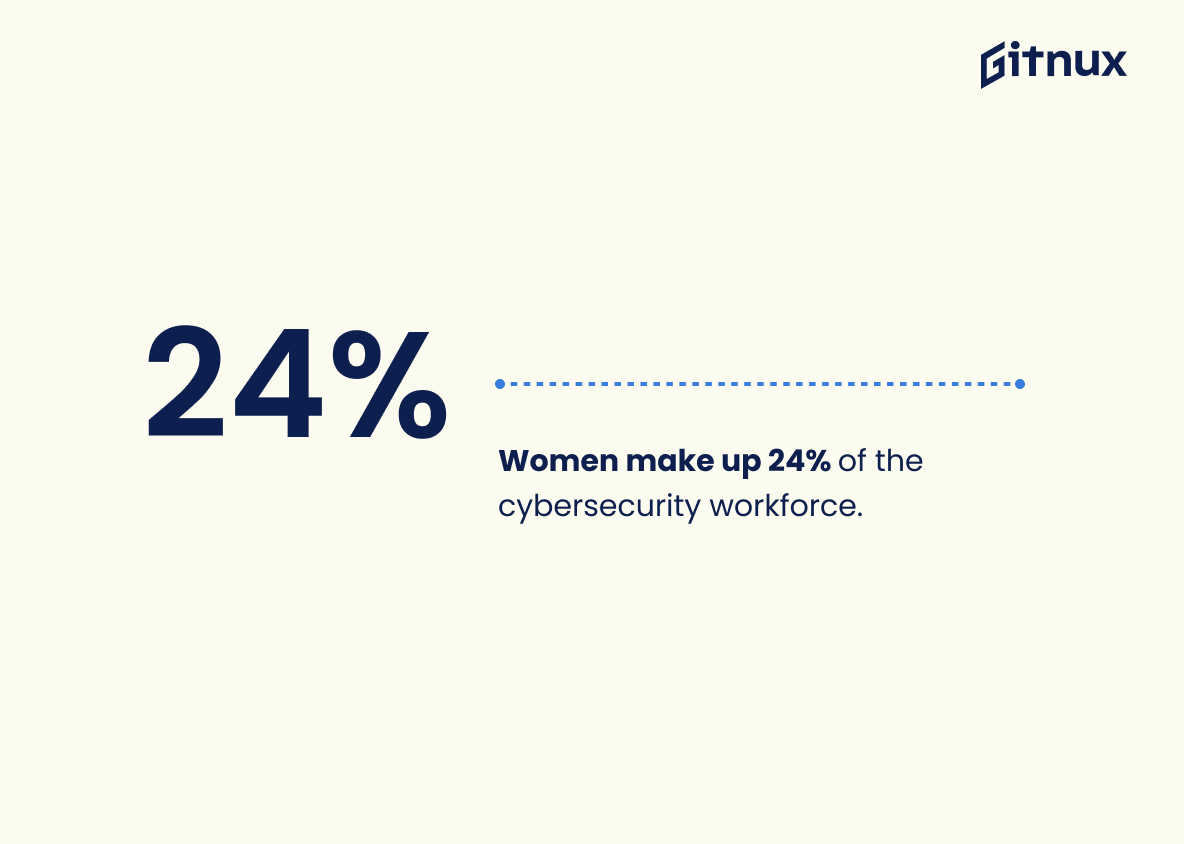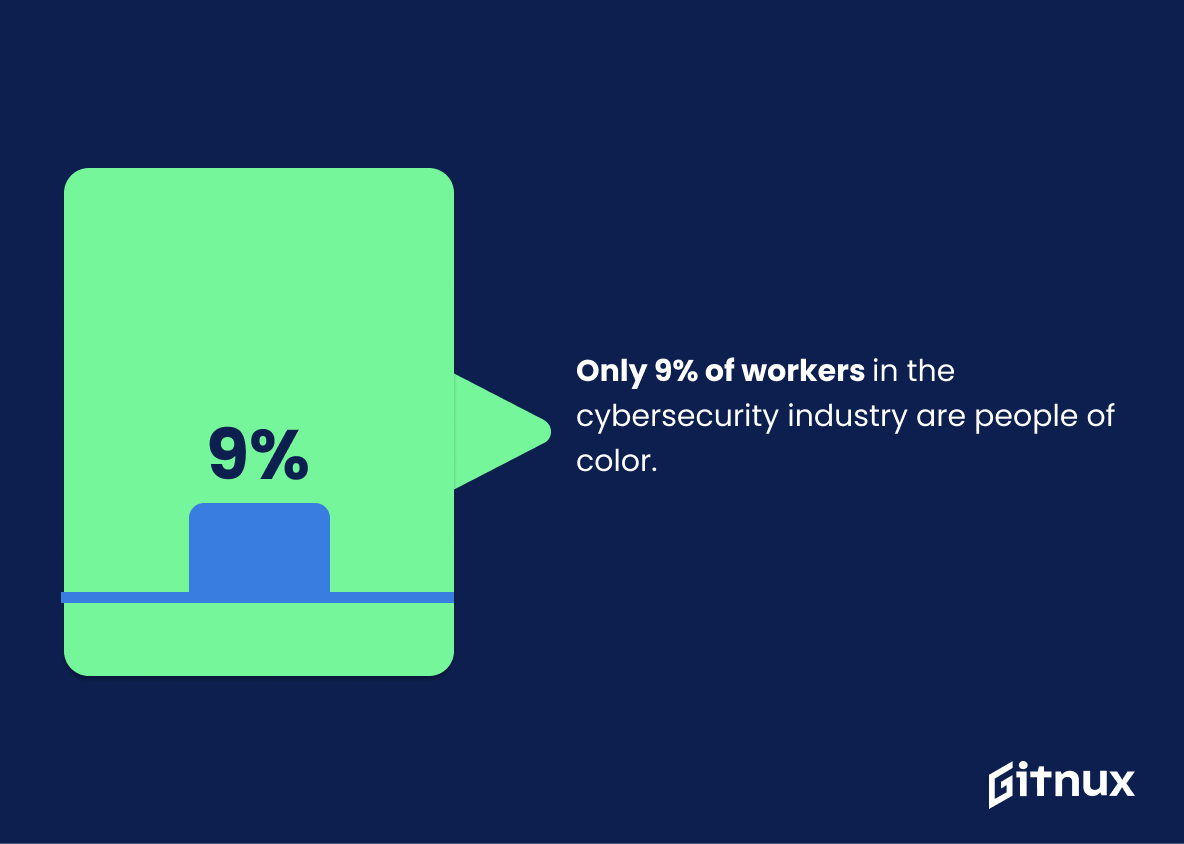The world of cybersecurity is an ever-evolving landscape, and it’s important to stay up to date on the latest trends and developments. One of the most important topics to consider is the diversity of the cybersecurity workforce.
In this blog post, we will take a look at the latest cybersecurity diversity statistics and discuss what they mean for the industry. We’ll also explore the potential implications of these numbers and what can be done to increase diversity in the cybersecurity field.
Check out our latest Cybersecurity Statistics
Cybersecurity Diversity: The Most Important Statistics
75% of today’s cybersecurity workers are men, and the global cybersecurity workforce is short 3.5 million workers in 2021.
Women’s representation in the global cybersecurity workforce is projected to increase from 25% in 2022 to 35% in 2031.
Cybersecurity Diversity: Statistics Overview
The cybersecurity field has lacked diversity since its inception, with women and people of color still underrepresented. This lack of diversity in the cybersecurity field matters because it can lead to a lack of understanding of the needs of different communities and can lead to a lack of innovation and creativity in the field.
This can lead to a lack of trust in the industry, as people from underrepresented backgrounds may not feel comfortable or safe in the industry.
Black (9%), Hispanic (4%), and Asian (8%) women professionals make up a disproportionately low percentage of the cybersecurity workforce.
This matters because diversity in the cybersecurity workforce is essential for the development of effective security solutions.
A diverse workforce allows for a variety of perspectives and experiences to be brought to the table, which can lead to better problem-solving and more creative solutions. Having a diverse workforce can help to ensure that security solutions are tailored to the needs of a wide range of users.
Diversity in the cybersecurity industry can help improve online defenses by introducing new perspectives and ideas. This matters because having a diverse team of professionals can help to identify and defend against potential threats that may not have been considered before. This can help to create a more secure online environment for everyone.
Despite tech and cybersecurity companies’ efforts to increase DEI, the cybersecurity industry remains overwhelmingly white and male. This lack of diversity in the cybersecurity industry can lead to a lack of innovation and understanding of the needs of different communities.
This can lead to a lack of security measures that are tailored to the needs of different communities, which can lead to an increased risk of cyberattacks.
24% of the cybersecurity workforce are women.
This statistic highlights the need for greater diversity in the cybersecurity field. A more diverse workforce can lead to better problem-solving, better decision-making, and a better understanding of the needs of different customers. Additionally, it can help to create a more inclusive environment and foster a sense of belonging for all employees.
Women’s representation in the global cybersecurity workforce is projected to increase from 25% in 2022 to 35% in 2031.
This statistic shows that the number of women in the cybersecurity workforce is increasing, which is a positive step towards creating a more diverse and inclusive cybersecurity industry.
Increasing the number of women in the cybersecurity workforce can help to close the gender pay gap and create more opportunities for women in the field.
75% of today’s cybersecurity workers are men, and the global cybersecurity workforce is short 3.5 million workers in 2021.
This can lead to a lack of innovation and a lack of understanding of the needs of different populations. Diversity in a cybersecurity team helps to identify potential issues and problems. This can help to identify potential issues that may have been overlooked by a team that is not diverse.
Recruiting talent is becoming increasingly difficult, but a more inclusive talent pipeline would help to address this issue. This matters because a more inclusive talent pipeline would help to ensure that the Cybersecurity field is more diverse and representative of the population.
This would help to create a more equitable and inclusive environment, which could lead to better solutions and more innovative approaches to Cybersecurity.
52% of Cybersecurity workers are in the 35-54 age demographic, while only 30% are in the 19-34 age group.
This shows that the industry is not doing enough to attract young people, which could lead to a lack of diversity in the field.
The industry has been neglecting Baby Boomers and Gen Xers, leading to ageism in the workplace. Ageism can lead to a lack of representation of older generations in the workplace, which can lead to a lack of diversity in the industry.
This can have a negative impact on the overall security of the industry, as a lack of diversity can lead to a lack of different perspectives and ideas.
53% of all female respondents say the “glass ceiling” prevented them from obtaining certain positions in their organizations, while 71% of minority females responded that a “glass ceiling” prevented their advancement in cybersecurity.
This statistic highlights the gender and racial disparities that exist in the cybersecurity field. It demonstrates that women and minority women face an even greater challenge when it comes to achieving higher positions and opportunities in the field. This statistic also emphasizes the importance of advocating for diversity and inclusion initiatives in order to ensure that everyone has an equal chance to succeed in the cybersecurity field.
Supplementary Statistics
Women make up 24% of the cybersecurity workforce.
This highlights the need for greater efforts to promote diversity and inclusion in the field, as well as the need for more women to be encouraged to pursue careers in cybersecurity.
Only 9% of workers in the cybersecurity industry are people of color.
This highlights the need for greater inclusion of people of color in the field, as well as the need for more equitable opportunities for those who are already in the industry. It is a call to action for organizations to take steps to ensure that their cybersecurity teams are representative of the diversity of their customer base.
In 2018, there were 2.08 million cybersecurity professionals in the US, with 26% coming from minority groups.
The industry is making strides towards creating a more inclusive environment, with a quarter of the professionals coming from minority groups. This is an encouraging sign that the industry is taking steps to ensure that everyone has an equal opportunity to succeed in the field.
76% of female cybersecurity professionals believe that their organizations need to do more to foster a diverse and inclusive workplace.
This statistic is a powerful reminder of the need for organizations to take action in order to create a more diverse and inclusive workplace for female cybersecurity professionals. It highlights the importance of creating an environment where everyone feels welcome and respected, regardless of gender. This statistic is a call to action for organizations to take steps to ensure that their cybersecurity teams are reflective of the diversity of the world around them.
14% of the total cybersecurity workforce have a disability.
There is a need for organizations to ensure that their hiring practices are accessible to people with disabilities, and that their workplace is supportive of their needs. It also serves as a reminder that diversity in the cybersecurity workforce is essential for creating a more secure and resilient digital infrastructure.
The global cybersecurity workforce is estimated to have a shortfall of 3.5 million professionals by 2021.
With a projected shortfall of 3.5 million professionals by 2021, it is clear that the industry is in dire need of a more diverse and inclusive workforce. Without a diverse and inclusive workforce, the industry will be unable to meet the demands of the ever-evolving cybersecurity landscape.
57% of cybersecurity professionals believe that diverse teams lead to more effective problem-solving.
The majority of professionals recognize the importance of having a diverse team when it comes to problem-solving, and that they understand the potential benefits that can come from having a variety of perspectives and experiences in the room. This statistic is an important reminder that diversity is not only beneficial, but essential, for effective cybersecurity.
30% of women in cybersecurity earn less than their male colleagues in similar positions.
This highlights the need for greater gender equality in the workplace, and serves as a call to action for organizations to take steps to ensure that women in cybersecurity are paid fairly and equitably. It also serves as a reminder that diversity and inclusion initiatives are still needed in the cybersecurity industry, and that more work needs to be done to ensure that all genders are represented and respected in the workplace.
87% of cybersecurity professionals are male.
This is a call to action for organizations to take steps to create a more inclusive and diverse environment for all professionals in the cybersecurity field.
45% of organizations have established programs focused on increasing diversity in the cybersecurity workforce.
Organizations are taking the initiative to create programs that promote diversity and inclusion in the field. This is an important step in creating a more equitable and inclusive environment for all cybersecurity professionals.
Women in cybersecurity are more likely than men to have non-technical backgrounds (60% compared to 40%).
Having a diverse range of backgrounds and perspectives can be beneficial to the industry, as it can lead to more innovative solutions and better security practices. Furthermore, it highlights the need for more women to be included in the cybersecurity workforce, as they can bring a unique set of skills and experiences to the table. Ultimately, this statistic serves as a reminder that diversity is essential for the success of the cybersecurity industry.
The number of women in cybersecurity leadership roles has increased from 11% to 24% between 2017 and 2021.
The industry is taking steps to ensure that women are represented in leadership roles, which is essential for creating an inclusive and equitable environment. This statistic is a positive sign that the industry is making strides towards greater diversity and inclusion, and it is a reminder that there is still more work to be done.
62% of female cybersecurity professionals believe that a formal mentorship program could help attract more diverse candidates.
Female cybersecurity professionals recognize the value of mentorship in creating a more inclusive environment and are willing to take action to make it happen. This statistic is an important reminder that mentorship can be a powerful tool in promoting diversity and inclusion in the cybersecurity industry.
Over 52% of Insurers do not have any diversity and inclusion initiatives in their cybersecurity teams.
Without such initiatives, organizations risk missing out on the unique perspectives and experiences that diverse teams can bring to the table.
35% of minorities in cybersecurity feel discriminated against in the workplace, compared to 16% of non-minorities.
This serves as a call to action for employers to take steps to ensure that all employees, regardless of their background, feel respected and valued in the workplace.
55% of LGBTQ+ individuals in the cybersecurity industry have experienced discrimination at work.
This serves as a call to action for organizations to create a more equitable and inclusive workplace. It also serves as a reminder that diversity and inclusion are not just about numbers, but about creating an environment where everyone feels safe and respected.
Over 26% of cybersecurity professionals spent their childhood in low-income households.
Many professionals in the industry come from disadvantaged backgrounds, and that their success is a testament to their hard work and dedication. It also serves as a reminder that the cybersecurity field should be open to all, regardless of their economic background, and that everyone should have the opportunity to pursue a career in this field.
Older cybersecurity professionals (>55 years old) only represent about 8% of the global cybersecurity workforce.
This highlights the need for more experienced professionals to join the field, as well as the need for more diverse representation in the industry. It also serves as a reminder that the cybersecurity industry is still largely dominated by younger generations, and that there is a need to create more opportunities for older professionals to join the field.
Approximately 51% of cybersecurity professionals have military experience.
This highlights the value of the skills and knowledge gained in the military, and how they can be applied to the cybersecurity industry. It also speaks to the diversity of the cybersecurity workforce, as it shows that a significant portion of the professionals in the field have a military background. This statistic is a reminder that the cybersecurity industry is open to people from all walks of life, and that military experience can be a valuable asset.
Conclusion
In conclusion, it is clear that the cybersecurity industry has a long way to go when it comes to achieving diversity. Although there have been some improvements in recent years, the overall picture is still one of the underrepresentation of women and minorities.
It is important for organizations to take steps to create a more diverse and inclusive workplace, as this will lead to better security practices and a more secure digital world. Companies should also look to invest in initiatives that promote diversity in the cybersecurity industry, such as mentorship programs and scholarships. By doing so, they can help to create a more diverse and equitable future for the industry.
References
TechCrunch: “Connecting the dots on diversity in cybersecurity recruitment”, cited February 2023. (Source)
CyberDegrees: “Why Diversity in Cybersecurity Matters”, cited February 2023. (Source)
World Economic Forum: “Why cybersecurity needs a more diverse and inclusive workforce”, cited February 2023. (Source)
World Economic Forum: “Empowering women can help fix the cybersecurity staff shortage”, cited February 2023. (Source)
ZDNET: “Why improving diversity in cybersecurity is vital for everyone”, cited February 2023. (Source)
The Aspen Institute: “Building a More Diverse Cyber Industry”, cited February 2023. (Source)
University of Maryland Global Campus: “GENDER DIVERSITY IN CYBERSECURITY”, cited February 2023. (Source)
(ISC)²: “Women in Cybersecurity”, cited February 2023. (Source)
Cybercrime Magazine: “Women Hold 25 Percent Of Cybersecurity Jobs Globally In 2022”, cited February 2023. (Source)
Information Age: “Why diversity matters when recruiting cybersecurity staff”, cited February 2023. (Source)
SC Media: “Only 30% of the cyber workforce is in the 19-34 age demographic”, cited February 2023. (Source)
SpiceWorks: “Ageism in Cybersecurity: Why Baby Boomers and Gen-Xers Matter in 2022”, cited February 2023. (Source)
